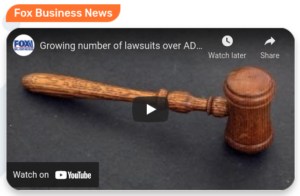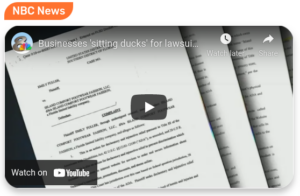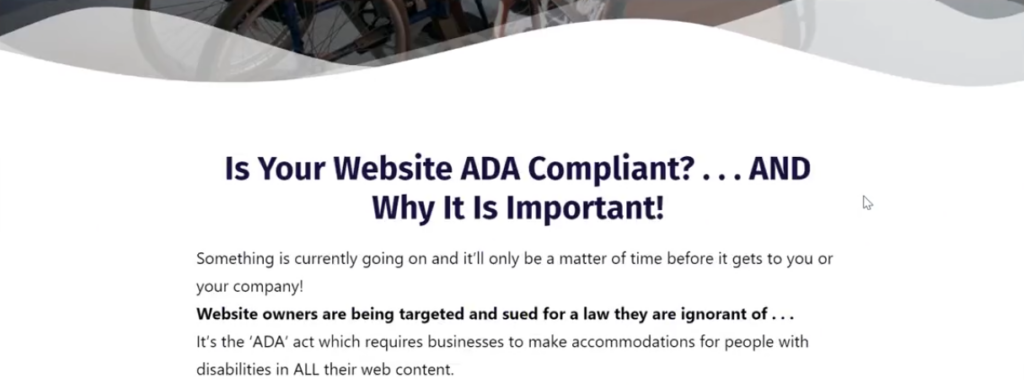
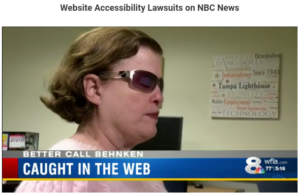 The Website Accessibility Guidelines & ADA Now Apply GLOBALLY and they apply to EVERY Business Website. If your website or your client’s website is not compliant, you’re open to be sued for tens of thousands of pounds / dollars. Don’t get caught out!Internationally ALL websites have to comply with the Web Accessibility Guidelines and in addition inside the US, ALL websites have to comply with the Americans With Disabilities Act (ADA)…Meaning your websites MUST be accessible to people with disabilities, e.g. anyone with issues to hear or see, anyone using a hearing aid etc. when they’re online.If your or your client’s website doesn’t comply, your business can be sued easily and quickly. In fact, there have been over 10,000 (!) lawsuits about this in 2021, just in the US alone and the EU and the UK have enabled this to. Watch this clip for more information and see below Plaintiffs are getting together with lawyers and although Plaintiffs can not benefit directly, the lawyers are able to take up the case on their behalf and from the money either settled out of court or from the court fees they can pay out an introductory fee to the plaintiff which is an substantial amount. One blind lady has 150 law suits taken out on her behalf with companies being forced to settle anywhere from 50,000 up to 150,000 dollars. What people don’t realise is that WCAG applies Globally and has been taken up by the EU with new legislation and the UK as well.
The Website Accessibility Guidelines & ADA Now Apply GLOBALLY and they apply to EVERY Business Website. If your website or your client’s website is not compliant, you’re open to be sued for tens of thousands of pounds / dollars. Don’t get caught out!Internationally ALL websites have to comply with the Web Accessibility Guidelines and in addition inside the US, ALL websites have to comply with the Americans With Disabilities Act (ADA)…Meaning your websites MUST be accessible to people with disabilities, e.g. anyone with issues to hear or see, anyone using a hearing aid etc. when they’re online.If your or your client’s website doesn’t comply, your business can be sued easily and quickly. In fact, there have been over 10,000 (!) lawsuits about this in 2021, just in the US alone and the EU and the UK have enabled this to. Watch this clip for more information and see below Plaintiffs are getting together with lawyers and although Plaintiffs can not benefit directly, the lawyers are able to take up the case on their behalf and from the money either settled out of court or from the court fees they can pay out an introductory fee to the plaintiff which is an substantial amount. One blind lady has 150 law suits taken out on her behalf with companies being forced to settle anywhere from 50,000 up to 150,000 dollars. What people don’t realise is that WCAG applies Globally and has been taken up by the EU with new legislation and the UK as well.

Website owners are being targeted and sued for a law that they are ignorant of. ADA & WCAG provides that web content should be accessible to the blind, deaf and those who must navigate by voice, screen readers or other assistive technologies…




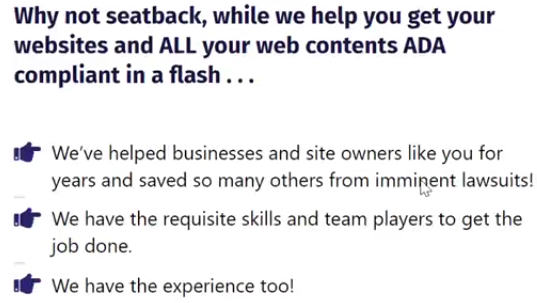 Although this is more predominate in the USA currently you can be sure this will make its way into the UK. The accessibility regulations came into force for public sector bodies in the UK on 23 September 2018. Under the Equality Act 2010 or the Disability Discrimination Act 1995 (in Northern Ireland) you’re still legally required to make reasonable adjustments for disabled people when they’re needed.
Although this is more predominate in the USA currently you can be sure this will make its way into the UK. The accessibility regulations came into force for public sector bodies in the UK on 23 September 2018. Under the Equality Act 2010 or the Disability Discrimination Act 1995 (in Northern Ireland) you’re still legally required to make reasonable adjustments for disabled people when they’re needed.
The European Union (EU) Directive on the Accessibility of Websites and Mobile Applications requires EU member states to make sure their websites and mobile apps meet common accessibility standards. The Directive uses the four principles of the Web Content Accessibility Guidelines (WCAG) 2.0, requiring that public sector organisations across the EU take steps to make sure their websites are “Perceivable, Operable, Understandable, and Robust. So again, by meeting the WCAG 2.0 AA you will also comply with the EU Directive.
In the USA it is being reported that companies both small and large are being sued by users of websites through teams of ambulance chasing legal teams as they are encouraging people with disabilities to use their services to get get payouts as for most companies it is to costly to fight the claims through the courts. Although this is not yet happening in the UK, it is however leaving the door open and the worrying thing is there is little room to fight the claim as the person with the disability will be able to use the DDA or ADA and any attempt to go against this leads to bad publicity for the company or business concerned as they are then seemed to be uncaring.
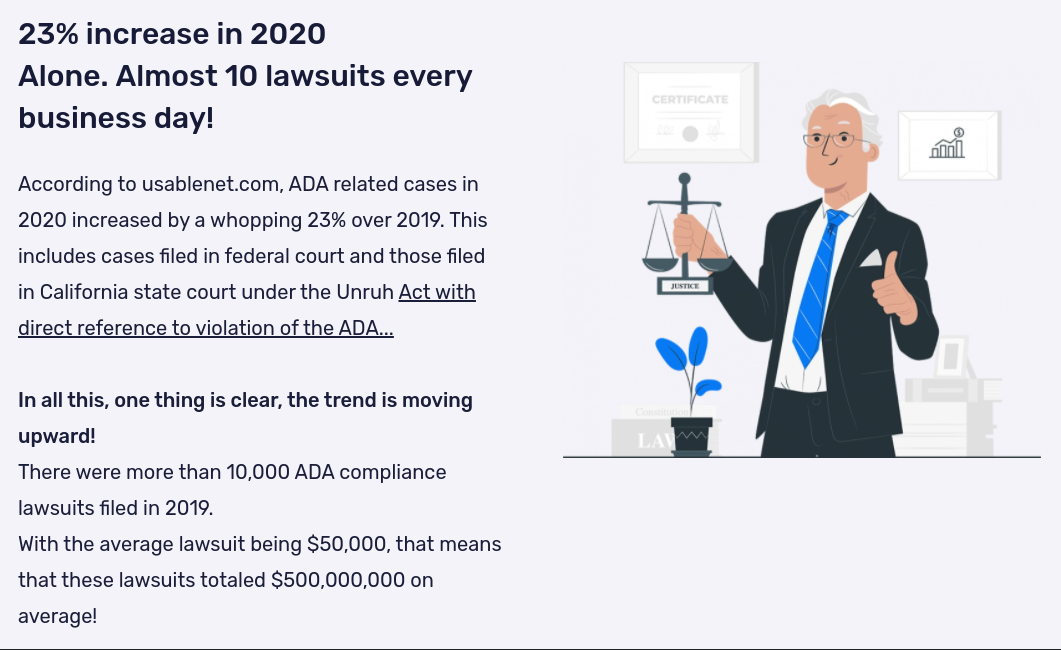
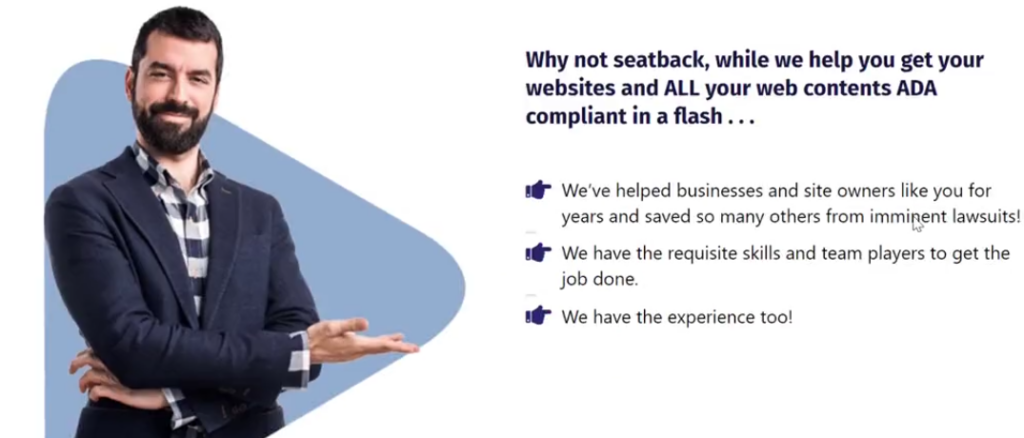

The first round of the Public Sector Bodies (Websites and Mobile Applications) (No 2) Accessibility Regulations 2018 came into force on 23/09 and mandates that Web and mobile content maintained by the UK Government be made accessible to people with disabilities. he Regulations are pursuant to the European Union (EU) Directive on the Accessibility of Websites and Mobile Applications (the “Directive”) which requires all public sector websites and applications in EU member states to implement, enforce and maintain accessibility standards on websites and mobile apps meet based on W3C Web content accessibility guidelines, or risk fines and legal penalties.
Although the Regulations apply to the public sector, they are a wake-up call for the public and private sector. As a rule of thumb, if your business considers disabilities for open access in your physical stores, you should also meet the legal accessibility requirements for your website. Companies will not be able to shift liability to Web and mobile app developers for non-compliant platforms. In the US the lawyers are already filing claims on behalf of Plaintiffs and it is expected that the same could happen in the UK. Currently it is only Gov sites and major blue-chip companies that are taking steps as they are the ones most at risk, but if the UK follows the US lead then all SME businesses could be at risk. Remember there is no prior warning once a case is filed the business is notified and the plaintiff only needs to show that they tried to use the website and was thwarted from doing so due to the non compliance to accommodate their specific disability.
The Regulations will be a more significant burden to SME’s who will need to review their website and mobile application terms and conditions with their lawyers and arrange accessibility conformity with their app development team to manage the risk of litigation, and should take steps to deal with any flaws in their website, and apps to make sure that disabled users have equality of access to consumer-facing content. Whether you are a small or medium sized business, it is imperative that you understand the regulations that govern websites and mobile app business in the UK, EU and worldwide.
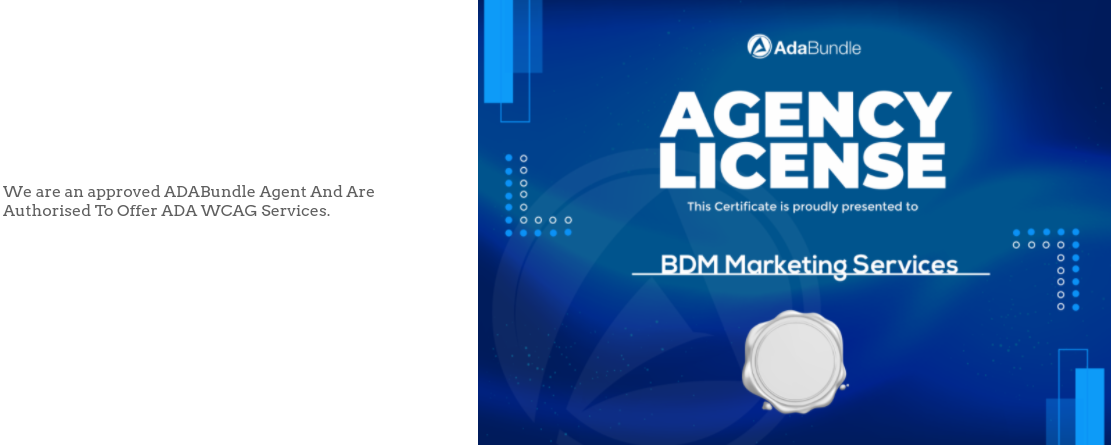
 To comply:
To comply:
You also need to make your website GDPR Compliant for Europe.
You also need to add all legal pages and keep them updates from time to time.
*You need to make your content available in audio-podcast format.
*We can also offer an Audio Book and eBook compilation service for which you can see more details here. We can take your content and or documentation and make this available in an audio format which can be used to fulfil this requirement for the main content material. We can also offer Virtual Web Agents that will be able to speak to the visitor of the website.

